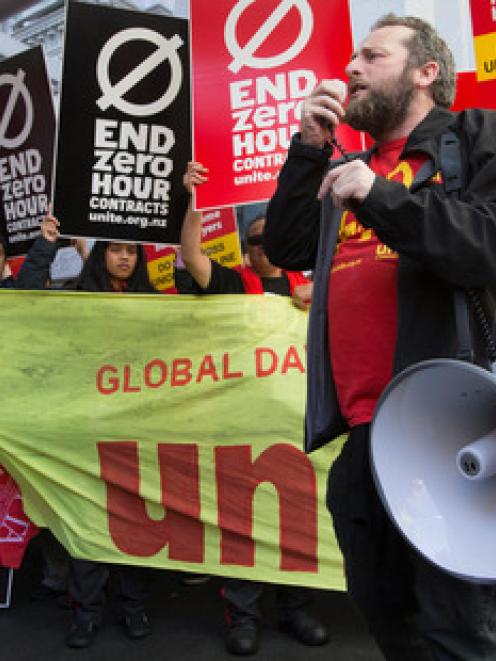
The noisy crowd gathered at the Britomart transport centre at midday and marched up to McDonald's Queen St, then a few doors further up the street to Wendy's, before marching back down to the waterfront.
McDonald's and Wendy's are the two biggest fast-food companies that workers say have refused to end zero-hours contracts, after Burger King agreed last night to put all workers on guaranteed shifts.
Restaurant Brands, which includes KFC, Pizza Hut, Starbucks and Carls Jnr, agreed last week to measure each worker's actual hours for three months and then guarantee them at least 80 per cent of their actual hours in the future.
McDonald's has offered to guarantee workers 80 per cent of their rostered hours, but Unite Union director Mike Treen said that offer was meaningless because the company did not make the rosters public.
Michelle Hooper, a 39-year-old mother of five who has worked at McDonald's in Panmure for four and a half years, said her income of $300-$400 a week was her family's sole income because her husband has not been able to work due to a back injury.
"I work 37 hours a week, it's not too bad, but I'm here to fight for everyone," she said.
She earns only $15.05 an hour. Mr Treen said the company had given all non-union members a 50c pay rise from April 1 in line with the rise in the legal minimum wage from $14.25 to $14.75 an hour, but the union was still negotiating new pay rates for union members.
Flatmates Nicole Vatu, 30, from the Clendon branch, and Lucy Tautagi, 19, from the Manurewa branch, said they both worked about 30 hours a week but both wanted 40 hours.
"They just don't give out enough hours of work. I come to all my shifts, yet they don't give me any more hours," said Ms Tautagi.
Both are still on only $14.80 an hour after two years and three and a half years working for the company.
Kelston worker Mario Baniecivich, 27, is still on only $14.75 after three years and normally works 26 to 30 hours a week.
"They only gave me 22 hours this week. It's unfair," he said.
A McDonald's spokesman said "Whether it's scheduled or worked hours, we're committed to moving away from zero hours contracts and we're committed to bargaining and working through the detail with Unite union. Unite have walked away from the bargaining table."
Meanwhile, a sea of people gathered outside a McDonald's restaurant in Wellington today as part of the worldwide protest.
At midday more than 50 people, made up of McDonald's workers, customers, union members and supporters held banners and chanted into megaphones outside McDonald's in Manners St in the CBD.
Today's strikes are the first in an international day of action by tens of thousands of fast-food workers demanding secure hours, better pay and union representation, the Unite Union said.
Union co-president Heleyni Pratley, who was helping lead today's protest in Wellington, said about 20 McDonald's workers from across the Wellington region were there to take action to end zero hour contracts.
"They have absolutely no security as to whether or not they can feed their family."
Speaking to the crowd, Ms Pratley lashed out at McDonald's: "All they care about is profit, they don't care about their staff, they don't care about their staffs' family, they don't care about people."
Ms Pratley said the staff turn-out was a "huge achievement because they are so intimidated".
"McDonald's is one of the largest corporations in the world and there is no reason why they can't guarantee their workers hours."
People holding banners from the New Zealand Council of Trade Unions, the Green Party, Mana Party, the New Zealand Educational Institute and First Union were also there to show support.
Kate Norquay and Maddie Taylor, both from Wellington, are employed at McDonald's Basin Reserve.
Ms Norquay said while she generally got enough work at the store she was at now, her roster used to fluctuate between four, to eight to 25 hours a week, and at times, she would struggle to make rent.
"I have quite a good situation [now] but I really feel for other people that really need consistency with their hours."
Ms Taylor said a colleague wanted to come to today's strike, but could not afford to take the two hours off work.
"She needs everything she gets," Ms Taylor said.
Both girls said they were thrilled with the turn-out.
"We have even seen a few of our regulars supporting us," Ms Taylor said.
Strike action was due to take place across all the main centres, starting from noon in Auckland, Palmerston North and Wellington, 5pm in Dunedin and 6pm in Christchurch.
The strike action has come after mediation attempts between unions and McDonald's fell through last night, with unions calling the fast food giant's offer a "joke".
However, McDonald's hit out at the union, saying the strike action was "a stunt" and had nothing to do with the negotiations.
In a statement, a McDonald's spokeswoman said the restaurant was committed to moving away from zero hours.
"Whether it's scheduled or worked hours, we're committed to moving away from zero hours contracts and we're committed to bargaining and working through the detail with Unite Union.
"Unite have walked away from the bargaining table."
Auckland Action Against Poverty spokeswoman Sue Bradford said beneficiaries should not be penalised for refusing jobs with no guaranteed minimum hours of work.
Ms Bradford said the potential law changes outlined by Mr Woodhouse didn't mention employment requirements for Work and Income.
She said while the Ministry of Social Development has said it doesn't sanction people for refusing to take casual, insecure work, "our group is aware that Work and Income officers often interpret policy in ways that aren't consistent with either common sense or national policy guidelines".
She urged the government to ensure any forthcoming bill did not require beneficiaries to take work that did not guarantee a minimum number of hours of work on fixed days each week.












